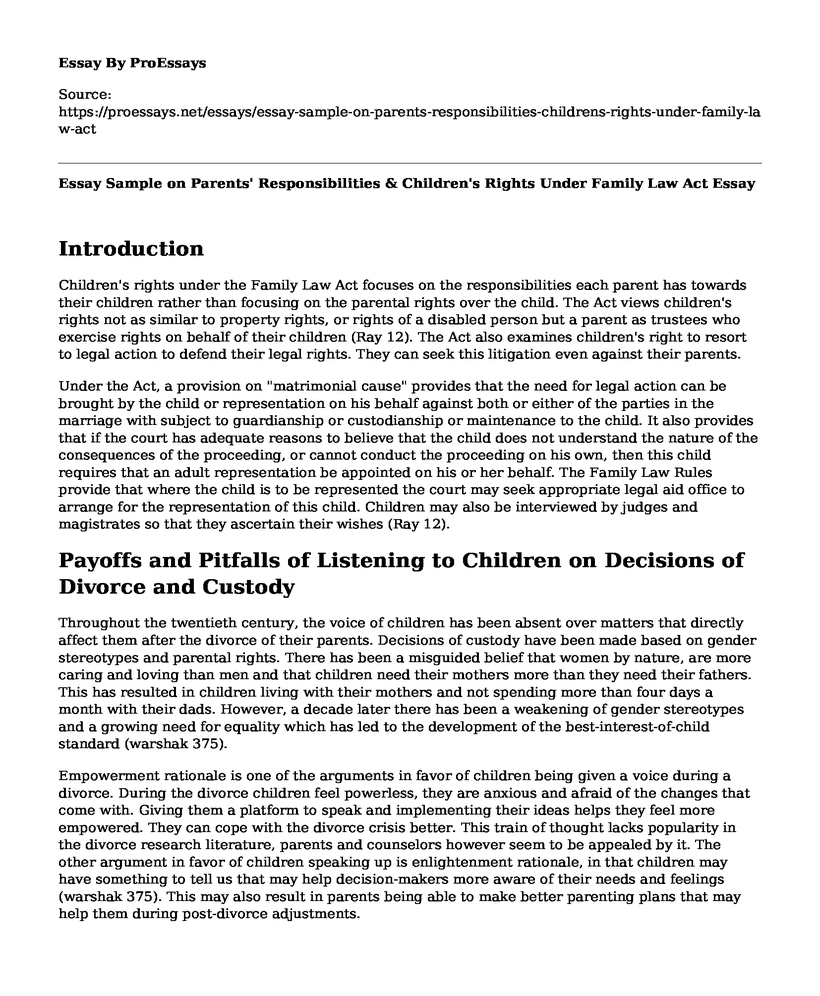Introduction
Children's rights under the Family Law Act focuses on the responsibilities each parent has towards their children rather than focusing on the parental rights over the child. The Act views children's rights not as similar to property rights, or rights of a disabled person but a parent as trustees who exercise rights on behalf of their children (Ray 12). The Act also examines children's right to resort to legal action to defend their legal rights. They can seek this litigation even against their parents.
Under the Act, a provision on "matrimonial cause" provides that the need for legal action can be brought by the child or representation on his behalf against both or either of the parties in the marriage with subject to guardianship or custodianship or maintenance to the child. It also provides that if the court has adequate reasons to believe that the child does not understand the nature of the consequences of the proceeding, or cannot conduct the proceeding on his own, then this child requires that an adult representation be appointed on his or her behalf. The Family Law Rules provide that where the child is to be represented the court may seek appropriate legal aid office to arrange for the representation of this child. Children may also be interviewed by judges and magistrates so that they ascertain their wishes (Ray 12).
Payoffs and Pitfalls of Listening to Children on Decisions of Divorce and Custody
Throughout the twentieth century, the voice of children has been absent over matters that directly affect them after the divorce of their parents. Decisions of custody have been made based on gender stereotypes and parental rights. There has been a misguided belief that women by nature, are more caring and loving than men and that children need their mothers more than they need their fathers. This has resulted in children living with their mothers and not spending more than four days a month with their dads. However, a decade later there has been a weakening of gender stereotypes and a growing need for equality which has led to the development of the best-interest-of-child standard (warshak 375).
Empowerment rationale is one of the arguments in favor of children being given a voice during a divorce. During the divorce children feel powerless, they are anxious and afraid of the changes that come with. Giving them a platform to speak and implementing their ideas helps they feel more empowered. They can cope with the divorce crisis better. This train of thought lacks popularity in the divorce research literature, parents and counselors however seem to be appealed by it. The other argument in favor of children speaking up is enlightenment rationale, in that children may have something to tell us that may help decision-makers more aware of their needs and feelings (warshak 375). This may also result in parents being able to make better parenting plans that may help them during post-divorce adjustments.
One major challenge of listening to children and the enlightenment rationale is that parents might confuse what children tell them what they need. Children's words may not reflect what they feel. A fact known by many child advocates is that children do not know what they want. When faced with that kind of family upheaval their feelings are temporary and fluctuating. Another argument of why children should not be given a meaningful voice is because this makes them be part of their parent's disputes (warshak 375). This is a burden too big for a child to bear and it affects their emotional stability.
Conclusion
Making co-parenting work is challenging but it is for the best interest of the kids. Both parents become an active part of their kids' lives. It makes an adjustment to divorce and visitations easier for both children and their parents.
Works Cited
Ray, Alan. "Family Law Act Perspectives-Parents' and Children's Rights." Legal Service Bull. 13 (1988): 12. Retrieved from: https://digitalcommons.law.umaryland.edu/cgi/viewcontent.cgi?referer=https://www.google.com/&httpsredir=1&article=1736&context=fac_pubs
Warshak, Richard A. "Payoffs and pitfalls of listening to children." Family relations 52.4 (2003): 373-384. Retrieved from: https://www.justice.gc.ca/eng/rp-pr/fl-lf/divorce/spsdpr-edpads/spsdpr-edpads.pdf
Cite this page
Essay Sample on Parents' Responsibilities & Children's Rights Under Family Law Act. (2023, Mar 27). Retrieved from https://proessays.net/essays/essay-sample-on-parents-responsibilities-childrens-rights-under-family-law-act
If you are the original author of this essay and no longer wish to have it published on the ProEssays website, please click below to request its removal:
- We Should Adopt the 100 Hours Community Service - Essay Sample
- Adopting Telecommuting as a Type of Work Arrangement Essay
- Essay Sample on The Meaning of Ethnicity
- Paper Example on Young Women's Christian Association: Symbolizing Body, Mind, Spirit Since 1855
- Diversity in the Defence Department: Exploring Demographic and Cognitive Differences - Essay Sample
- Free Report on INTJ Personality Type: My Jung Test Results
- Marriage and Family Therapy - Report Example







